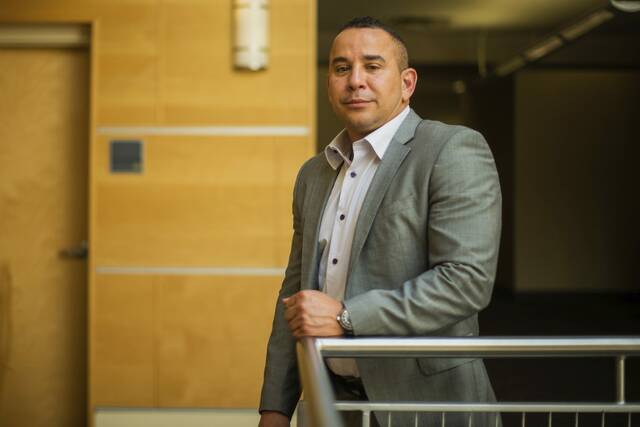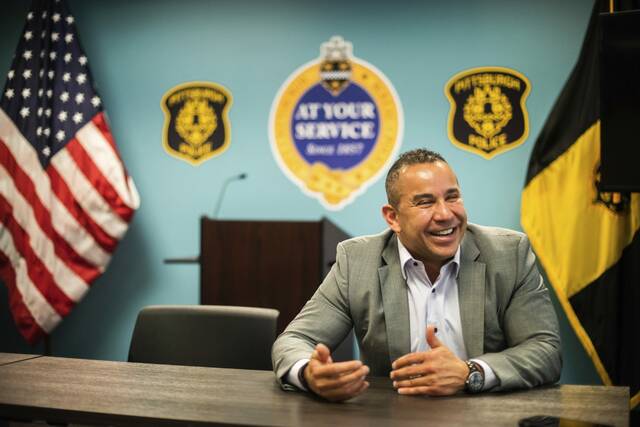The man in line to become Pittsburgh’s next police chief will be tasked with improving more than just public safety.
Observers say Larry Scirotto also will need to improve discipline, morale, diversity and training within the Pittsburgh police department, while boosting recruitment and community relations outside of it.
“You have an individual who can hit the ground running. He’s already rolled up his sleeves,” said Eric Holmes, a former Pittsburgh police officer who rose through the ranks with Scirotto in the 1990s and 2000s and is now Duquesne University’s police chief.
Scirotto, 49, joined the Pittsburgh police in 1995, climbing to become assistant chief before retiring in 2018.
“He has the energy and the stamina and the will and the want and the love for Pittsburgh and the Pittsburgh Bureau of Police,” Holmes added. “He’s the right person at the right time.”
Scirotto was nominated to be chief by Mayor Ed Gainey on May 3. The search process took six months. The nomination, which includes a starting salary of $180,000 a year, must be approved by City Council.
If confirmed, Scirotto would become the 55th police chief in the Pittsburgh force’s 165-year history. He would succeed Chief Scott Schubert, who retired in 2022.
Deputy Chief Thomas Stangrecki, a 35-year department veteran, had served as acting chief after Schubert’s departure.
“What we do matters, who we do it for matters,” Scirotto said in a wide-ranging interview with the Tribune-Review. “My mom, she always challenged me to improve the lives of others, not to be selfish. And, with that, you’re going to have some sacrifices. And so I’ve always thought of it like I’m a servant.”
“Even to this day, I want to leave this world better than when I got here,” he added. “I think that’s always been my personality. This profession allows me to do that in real time every day. If you’re committed to policing and being a guardian for our community, then you’ll be able to influence or impact in the most positive way.”
Change agent
Scirotto was one of three finalists to emerge in the search for a new chief.
He was joined by Frederick, Md., police Chief Jason Lando, who served 21 of his 23 years in law enforcement with the Pittsburgh police, and former Boise, Idaho, police Chief Ryan Lee.
Scirotto relocated from Dallas to a new home in Pittsburgh’s South Side. Raised in Monessen in the Mon Valley, Scirotto previously lived in the city’s Mt. Washington neighborhood.
During his past 23-year tenure with Pittsburgh police, Scirotto’s duties included serving as head of the major crimes unit and working in the K-9 unit and on narcotics investigations.
He later served as chief of the Fort Lauderdale department for less than a year, resigning in 2022 amid controversy over his minority promotions. Scirotto, who has filed a wrongful termination lawsuit against the Florida city, said the promotions were based on merit.
Of 15 promotions Scirotto made while chief in Fort Lauderdale, he said six were deemed ethnic or gender-based minorities.
“He came in to do a job, a job the city asked of him, and the leadership asked of him — and he did it,” said David Harris, a University of Pittsburgh law professor who served on the police chief search committee. “They didn’t like it. He didn’t back down. He did the job — that showed a certain amount of character, which I appreciated.”
“The fact that he was fired one time under bad circumstances does not make him a bad candidate, and I don’t think people get that yet,” Harris added. “When you’re known as a change agent, you’re going to ruffle feathers. There’s no getting around that.”
Scirotto said Gainey “was comfortable with the outcomes of what we had done for Fort Lauderdale.”
“I’ve never been given a charge from him on what to do next,” Scirotto said of Gainey. “I believe and know to be true that I can create an environment of fairness, so that we are always going to be cognizant and aware of the demographics of an organization, especially when we’re talking about community police partnerships.”
Scirotto said Pittsburgh police, a force that is currently about 85% white and 85% male, needs to be “an organization reflective of the community.”
“But it doesn’t for a moment suggest that we would elevate or focus on those that were less qualified because they follow a protected class,” he added.
Gainey did not respond to calls for comment on this article.
“It has to be a fair and lawful department,” said Beth Pittinger, executive director of the Citizen Police Review Board. “When you have the best-qualified candidate and they’re a member of a protected class, that’s a bonus.”
Officer discipline, training to be key
Scirotto also will be faced with enforcing a new disciplinary matrix — a guideline for dealing with disciplining of officers — that Gainey negotiated into the Fraternal Order of Police contract.
“One of the things in the city has been the inconsistent handling of discipline matters,” Pittinger said.
Pittinger pointed to the recent $8 million settlement in Jim Rogers’ wrongful death lawsuit with the city. Rogers, 54, a Black, homeless man, died Oct. 14, 2021, after being shocked with a Taser by Pittsburgh police at least 10 times in less than four minutes. The police officer who shocked him with a Taser, who also is Black, was investigating the report of a stolen bicycle on Bloomfield’s leafy Harriet Street at the time of the incident.
Pittinger called the Rogers death the result of bad training. Scirotto, who was not a Pittsburgh police officer at the time of the death, said he couldn’t comment on the specifics of the case. But he did stress the importance of empathy — and good training.
“What it appears to be was a lack of empathy. And how do you train that? It’s more philosophical than educational. It’s got to be part of the genetics of an organization that empathy is a character trait that we support,” Scirotto said. “Peace and order is intentional and the emotional piece (is) big.”
Use-of-force training started in Pittsburgh in 2016, and “a focus was to do no harm,” Scirotto said.
“That has to be continually reinforced, continually discussed in every avenue of training, of what we do,” he said. “Because at the end of the day, that’s what we’re asking. We’re asking officers to do no harm and leave these situations better than when you arrive.”
‘He’s got a big task ahead of him’
John T. Rago, a criminal law professor at Duquesne University, said a Scirotto will need to “convince the troops (he’s) on their side.”
Rago added: “It’s team-building. He’s got a big task ahead of him and … it’s not going to be easy.”
“The internal is just as important as the external,” said Holmes, when asked what advice he would give Scirotto. “You have to figure out how to do both at the same time. Being chief is a lot of listening, getting to learn the DNA of your organization. Don’t make too many changes too fast. And stay true. Stay true to the mission.”
Scirotto also is inheriting the top spot at a tipping point for staff, overtime and morale, observers of the police chief search said.
Pittsburgh police’s ranks could fall below 700 officers — 250 less than the city budget calls for — by 2025, city officials have said. Thirty-five Pittsburgh police officers retired in 2022, while another 39 officers resigned, many leaving for other area police departments.
Pittsburgh police now have about 820 active officers, down significantly from the 1990s when federal programs helped fund a bureau with about 1,700 officers.
Scirotto said he plans to recruit a diverse population of candidates and also focus on community relations in under-served neighborhoods.
“I’m glad to hear he’s talking (about recruitment) to other people — I like that,” said Pittsburgh Councilman Anthony Coghill, a vocal police supporter who met with Scirotto on Thursday. “I want to make sure he’s aware of the dangerously low numbers and where we’re headed.”
Coghill said his first impressions of Scirotto are that “he seems to have a grasp of the issues he’s facing.”
Coghill said his “number-one criteria” for the chief was experience in Pittsburgh.
“From the start, my main criteria was that (Gainey’s) pick has Pittsburgh roots and knows Pittsburgh,” Coghill said. “I don’t want someone who didn’t know Bloomfield from Brookline.”
Coghill said he wants to hear more from Scirotto on the contentious location of the police’s open-air firing range in the East End, which has drawn noise complaints from Highland Park residents. A community group called on Pittsburgh officials last week to shut down the range, calling the sound of gunfire from the 40-year-old facility “a public health issue.”
“This is a problem that has existed for nearly 40 years, and one that does not have an immediate short-term solution,” Gainey spokesperson Maria Montano said in response. “The design and build-out of a new facility will take time and until that is completed, we still have to make sure that our officers are trained to the best of their ability so they can help keep our city safe.”
Under former Mayor Bill Peduto, Pittsburgh officials planned to build a new public safety facility at the 168-acre Lincoln-Lemington property that previously housed the Veterans Affairs Pittsburgh Healthcare System. The firing range would have relocated to that location. Officials have estimated the project will cost more than $100 million.
Under Gainey, Scirotto also will no longer serve as an NCAA college basketball referee, a position he’s held part-time for much of his law-enforcement career. He defended his work as a ref, saying it has similarities with his work as a police officer.
“You deal with highly emotional, low-reasoning individuals in times of crisis. And oftentimes that’s what a basketball game looks like,” he said, laughing. “A sport can be very similar to our calls for service, our most intense calls for service. The ability to diffuse those at their highest emotional state with their lowest level of reasoning is important. It’s how I was successful in policing and it’s also how I was successful in officiating.”
Scirotto added: “Those that make it to the level that I have made in officiating possess those skill. We often say a good cop makes a good referee, or a great cop makes a great referee. A great referee would probably make a great cop because the personalities are very, very similar.”
Scirotto also is proud to say that he is the Pittsburgh police force’s first gay and biracial chief.
“I take that torch with pride to show that, yes, not only can you be a member, you can be a leader of this organization, within this profession,” Scirotto said.













